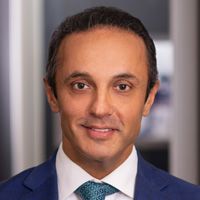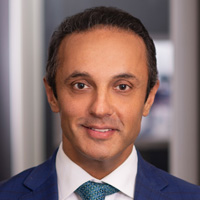Make Sure Your Financial Adviser Is a Fiduciary
By law, these pros must put your interests ahead of their own. Isn't that what you want?

Profit and prosper with the best of Kiplinger's advice on investing, taxes, retirement, personal finance and much more. Delivered daily. Enter your email in the box and click Sign Me Up.
You are now subscribed
Your newsletter sign-up was successful
Want to add more newsletters?

Delivered daily
Kiplinger Today
Profit and prosper with the best of Kiplinger's advice on investing, taxes, retirement, personal finance and much more delivered daily. Smart money moves start here.

Sent five days a week
Kiplinger A Step Ahead
Get practical help to make better financial decisions in your everyday life, from spending to savings on top deals.

Delivered daily
Kiplinger Closing Bell
Get today's biggest financial and investing headlines delivered to your inbox every day the U.S. stock market is open.

Sent twice a week
Kiplinger Adviser Intel
Financial pros across the country share best practices and fresh tactics to preserve and grow your wealth.

Delivered weekly
Kiplinger Tax Tips
Trim your federal and state tax bills with practical tax-planning and tax-cutting strategies.

Sent twice a week
Kiplinger Retirement Tips
Your twice-a-week guide to planning and enjoying a financially secure and richly rewarding retirement

Sent bimonthly.
Kiplinger Adviser Angle
Insights for advisers, wealth managers and other financial professionals.

Sent twice a week
Kiplinger Investing Weekly
Your twice-a-week roundup of promising stocks, funds, companies and industries you should consider, ones you should avoid, and why.

Sent weekly for six weeks
Kiplinger Invest for Retirement
Your step-by-step six-part series on how to invest for retirement, from devising a successful strategy to exactly which investments to choose.
When it comes to their retirement plans, what investors don't know definitely can hurt them—a lot.
That's why the U.S. Department of Labor thought it was necessary to step in recently with new rules that will require all financial professionals to adhere to the fiduciary standard when they're doling out recommendations to their clients about how to handle their qualified retirement plans and individual retirement accounts.
These new rules are being phased in and won't be in effect completely until January 1, 2018. But they could help investors make better decisions when choosing their financial professionals from the onset simply by bringing the subject to everyone's attention.
From just $107.88 $24.99 for Kiplinger Personal Finance
Become a smarter, better informed investor. Subscribe from just $107.88 $24.99, plus get up to 4 Special Issues

Sign up for Kiplinger’s Free Newsletters
Profit and prosper with the best of expert advice on investing, taxes, retirement, personal finance and more - straight to your e-mail.
Profit and prosper with the best of expert advice - straight to your e-mail.
After all, even if the DOL had taken no action, even if the issue had never found its way into the news, people should know whether their adviser is a fiduciary.
Of course, first they need to know what a fiduciary is.
Many people have no clue, a fact illustrated recently when Tony Robbins, the renowned personal-finance instructor and self-help author, decided to conduct one of those person-on-the-street interviews to find out how much, or how little, people know about their retirement investments.
He asked people he found walking on Wall Street—Wall Street, mind you—what a fiduciary is. No one knew the answer.
Well, actually, one person knew. He was a fiduciary!
The people Tony Robbins stopped to chat with also didn't know what kind of fees they were paying to have someone manage their 401(k) or other retirement accounts. Robbins was kind enough to point out that the folks he encountered aren't that atypical, and in fact the majority of people in America think they pay no fees at all. They are sadly mistaken because not only do they pay fees, but over time, because of compound interest, they can end up paying a significant chunk of money.
Clearly, the American public is in need of some financial education, and if the DOL's fiduciary ruling does nothing else, it may serve as a great awakening for investors who will start asking questions about how much they are paying for their investments to be managed and whose interests are really being served.
And that's a good thing.
So first things first: A fiduciary is a financial professional who is required by law to put the interests of clients ahead of his or her own interests.
Not all advisers do that. Many financial professionals are essentially selling products and are paid a commission. Think of it like buying a car. The car salesman might give you worthwhile advice on how to maintain the car to keep it running efficiently, but that's all secondary to the transaction. That car salesman is paid to convince you to buy the car, not to look out for your best interests.
In the world of investments, here's how that often plays out. Let's say an adviser has three funds he or she could recommend to you. But, unbeknownst to you, the adviser stands to collect a higher commission if you go with fund A instead of funds B or C. Fund C might be the best deal for you, but it's in the best interest of the adviser to sway you to go with fund A.
By law, a fiduciary can't do that. The fiduciary must always recommend what is in the client's best interest. Instead of a sales commission, fiduciaries are paid a fee that is linked to the value of the client's portfolio. The better the portfolio performs, the better the fiduciary is paid.
So be sure that any financial professionals you choose to work with take a fiduciary oath and know that they are putting your best interest first.
As more people learn about fiduciaries—and hopefully do a better job of answering the questions the next time Tony Robbins strolls down Wall Street with a camera—the more informed about their investment decisions will become.
Reid Abedeen is a partner at Safeguard Investment Advisory Group, LLC. As an Investment Advisor Representative and Insurance Professional (California license #0C78700), he has helped retirees with their financial issues for nearly two decades.
Ronnie Blair contributed to this article.
The appearances in Kiplinger were obtained through a PR program. The columnist received assistance from a public relations firm in preparing this piece for submission to Kiplinger.com. Kiplinger was not compensated in any way.
Profit and prosper with the best of Kiplinger's advice on investing, taxes, retirement, personal finance and much more. Delivered daily. Enter your email in the box and click Sign Me Up.

Reid Abedeen is the managing partner at Safeguard Investment Advisory Group, LLC. As an investment adviser, he has been helping retirees with insurance, long-term care planning, financial services, asset protection and other issues for more than 20 years. Abedeen has a degree in business administration. He holds California Life-Only and Accident and Health licenses and a Series 65 license, and he is registered through the Financial Industry Regulatory Authority.
-
 Nasdaq Leads a Rocky Risk-On Rally: Stock Market Today
Nasdaq Leads a Rocky Risk-On Rally: Stock Market TodayAnother worrying bout of late-session weakness couldn't take down the main equity indexes on Wednesday.
-
 Quiz: Do You Know How to Avoid the "Medigap Trap?"
Quiz: Do You Know How to Avoid the "Medigap Trap?"Quiz Test your basic knowledge of the "Medigap Trap" in our quick quiz.
-
 5 Top Tax-Efficient Mutual Funds for Smarter Investing
5 Top Tax-Efficient Mutual Funds for Smarter InvestingMutual funds are many things, but "tax-friendly" usually isn't one of them. These are the exceptions.
-
 Social Security Break-Even Math Is Helpful, But Don't Let It Dictate When You'll File
Social Security Break-Even Math Is Helpful, But Don't Let It Dictate When You'll FileYour Social Security break-even age tells you how long you'd need to live for delaying to pay off, but shouldn't be the sole basis for deciding when to claim.
-
 I'm an Opportunity Zone Pro: This Is How to Deliver Roth-Like Tax-Free Growth (Without Contribution Limits)
I'm an Opportunity Zone Pro: This Is How to Deliver Roth-Like Tax-Free Growth (Without Contribution Limits)Investors who combine Roth IRAs, the gold standard of tax-free savings, with qualified opportunity funds could enjoy decades of tax-free growth.
-
 One of the Most Powerful Wealth-Building Moves a Woman Can Make: A Midcareer Pivot
One of the Most Powerful Wealth-Building Moves a Woman Can Make: A Midcareer PivotIf it feels like you can't sustain what you're doing for the next 20 years, it's time for an honest look at what's draining you and what energizes you.
-
 I'm a Wealth Adviser Obsessed With Mahjong: Here Are 8 Ways It Can Teach Us How to Manage Our Money
I'm a Wealth Adviser Obsessed With Mahjong: Here Are 8 Ways It Can Teach Us How to Manage Our MoneyThis increasingly popular Chinese game can teach us not only how to help manage our money but also how important it is to connect with other people.
-
 Looking for a Financial Book That Won't Put Your Young Adult to Sleep? This One Makes 'Cents'
Looking for a Financial Book That Won't Put Your Young Adult to Sleep? This One Makes 'Cents'"Wealth Your Way" by Cosmo DeStefano offers a highly accessible guide for young adults and their parents on building wealth through simple, consistent habits.
-
 Global Uncertainty Has Investors Running Scared: This Is How Advisers Can Reassure Them
Global Uncertainty Has Investors Running Scared: This Is How Advisers Can Reassure ThemHow can advisers reassure clients nervous about their plans in an increasingly complex and rapidly changing world? This conversational framework provides the key.
-
 I'm a Real Estate Investing Pro: This Is How to Use 1031 Exchanges to Scale Up Your Real Estate Empire
I'm a Real Estate Investing Pro: This Is How to Use 1031 Exchanges to Scale Up Your Real Estate EmpireSmall rental properties can be excellent investments, but you can use 1031 exchanges to transition to commercial real estate for bigger wealth-building.
-
 The 8 Stages of Retirement: An Expert Guide to Confidence, Flexibility and Fulfillment, From a Financial Planner
The 8 Stages of Retirement: An Expert Guide to Confidence, Flexibility and Fulfillment, From a Financial PlannerRetirement planning is less about hitting a "magic number" and more about an intentional journey — from understanding your relationship with money to preparing for your final legacy.